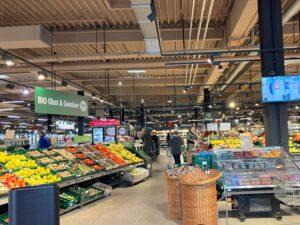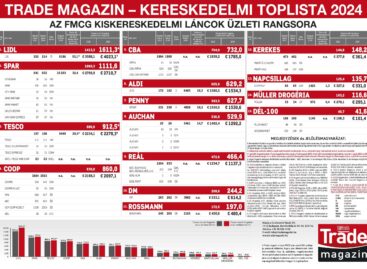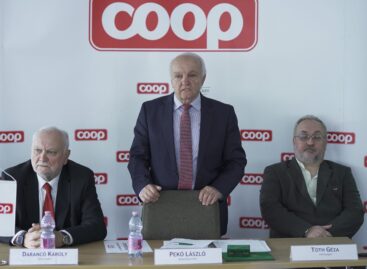Who won and who lost in 2024? – Spectacular differences in results in food retail
The balance of the 2024 business year in the food retail sector was spectacularly divided: while some chains closed with a heavy billion-dollar loss, others recorded a stable profit – it was revealed after the publication of the annual reports at the end of May. Based on the compilation of the Index, the losses are primarily due to the effect of special taxes and mandatory promotions, but the operating model also plays a significant role.
SPAR: deepening losses despite rising sales
 SPAR Hungary achieved sales of 924.39 billion forints in 2024 – this is 41.66 billion more than the previous year’s figures. However, the operating result did not follow this expansion: the loss of 18.28 billion forints in 2023 was followed by a minus of 24.75 billion in 2024. According to the company’s quick response, the main reason for this was the additional burden of the special retail tax (32.4 billion HUF), the extra profit tax, and the mandatory sale (4.2 billion HUF).
SPAR Hungary achieved sales of 924.39 billion forints in 2024 – this is 41.66 billion more than the previous year’s figures. However, the operating result did not follow this expansion: the loss of 18.28 billion forints in 2023 was followed by a minus of 24.75 billion in 2024. According to the company’s quick response, the main reason for this was the additional burden of the special retail tax (32.4 billion HUF), the extra profit tax, and the mandatory sale (4.2 billion HUF).
However, the company’s expansion activities were not hampered by the loss: two new stores were opened and four were renovated. At the end of December, 347 of its own stores were operating – despite 23 store closures. SPAR’s operating model – supermarkets close to home, requiring a lot of live labor, meat and delicatessen counters, domestically purchased goods, non-standard store structure – is less flexible on the cost side, and therefore more sensitive to market and regulatory pressure.
Aldi: spectacular revenue growth, with a heavy loss
Aldi, which belongs to the discount segment, achieved revenue of 518.36 billion HUF in 2024 – compared to 490.24 billion in 2023. Despite the growth, the loss increased significantly: after 9.48 billion in 2023, the company recorded a loss of 27.36 billion forints in 2024. Despite this, according to the management, there was no uncertainty regarding the continuation of the company’s operations.
Penny: stable growth, with strengthened profit
Penny-Market Kft. became one of the winners of the discount sector: its turnover of 518.62 billion forints not only surpassed Aldi, but its after-tax profit also increased: from 4.34 billion in 2023 to 4.74 billion. The company partially justified its success with the increase in purchasing power, effective loyalty programs and the opening of a new store. The positive result also increased its equity to 16 billion forints.
Auchan: new owner, old trends have reached a turning point
Although Auchan’s sales revenue decreased slightly (from 368.63 to 366.31 billion forints), its after-tax profit increased dramatically: from 586 million forints in 2023 to 6.89 billion forints in 2024. The company’s equity also increased by 6.89 billion forints, while its long-term liabilities increased to 25.5 billion forints. The new era began in November 2024: with the approval of the Hungarian Competition Authority, Dániel Jellinek acquired a 47 percent stake, also receiving the right to control as a minority owner.
Tesco and Lidl: in a time lag
The two largest market players, Tesco and Lidl, close according to the March-February business year, so their annual data is not yet public. According to the latest available data, Lidl achieved sales of 1,157.37 billion forints in the 2023–2024 business year, with a profit of 26.8 billion. Tesco closed with a loss of 21.57 billion forints on sales of 721.63 billion forints.
Apples with pears?
Comparing financial indicators in itself can be misleading, the report warns. Discount chains (such as Aldi, Penny, Lidl) operate with a completely different cost structure and business model than supermarkets (such as SPAR) or hypermarkets (such as Tesco and Auchan). The simple, fast, price-sensitive shopping-optimized operation of discounters is more cost-effective. In contrast, hypermarkets and supermarkets often operate on a larger floor space, with more live labor, and more complex logistics – and this is reflected in the loss line.
CBA, Coop, Reál: invisible results
The results of the nationally known but legally and financially loose network structures of CBA, Coop and Reál cannot be followed from individual reports, as they consist of the independent operations of hundreds of member companies.
Related news
The 2024 FMCG Retailer Ranking is out now
Everything remains the same: Lidl, SPAR and Tesco are the…
Read more >The National Trade Association held its general meeting
At its annual general assembly, the National Trade Association (OKSZ)…
Read more >Coop achieved sales of 860 billion in 2024
Thanks to an increase of about 4 percent, the COOP…
Read more >Related news
The 2024 FMCG Retailer Ranking is out now
Everything remains the same: Lidl, SPAR and Tesco are the…
Read more >The National Trade Association held its general meeting
At its annual general assembly, the National Trade Association (OKSZ)…
Read more >Coop achieved sales of 860 billion in 2024
Thanks to an increase of about 4 percent, the COOP…
Read more >



